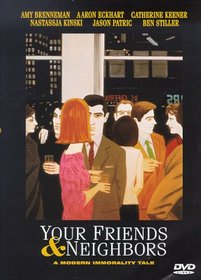| Actors: Amy Brenneman, Aaron Eckhart, Ben Stiller, Nastassja Kinski, Catherine Keener Director: Neil LaBute Creators: Jason Patric, Nancy Schreiber, Neil LaBute, Joel Plotch, Alix Madigan, Philip Steuer, Stephen Pevner, Steve Golin Genres: Comedy, Drama, Educational Sub-Genres: Comedy, Drama, Educational Studio: Polygram USA Video Format: DVD - Color,Full Screen,Widescreen,Anamorphic - Closed-captioned DVD Release Date: 07/13/1999 Original Release Date: 08/21/1998 Theatrical Release Date: 08/21/1998 Release Year: 1999 Run Time: 1hr 40min Screens: Color,Full Screen,Widescreen,Anamorphic Number of Discs: 1 SwapaDVD Credits: 1 Total Copies: 0 Members Wishing: 3 MPAA Rating: NC-17 Subtitles: English, French See Also: |
Search - Your Friends & Neighbors on DVD
  | Your Friends Neighbors Actors: Amy Brenneman, Aaron Eckhart, Ben Stiller, Nastassja Kinski, Catherine Keener Director: Neil LaBute Genres: Comedy, Drama, Educational NC-17 1999 1hr 40min In the age of ever-increasing crassness on screen (see the Farrelly brothers' comedies), there are some filmmakers who can make serious commentary instead of just throwaway gags. Neil LaBute's second feature is a corkscrew... more » |
Larger Image |
Movie DetailsSimilar Movies
Similarly Requested DVDs
|
Movie ReviewsDefinitely not entertaining.. L. Quido | Tampa, FL United States | 04/25/2003 (4 out of 5 stars) "by any stretch of the viewers' imagination! Director Neil LaBute does not seek to entertain, but to expose, in this morality play, I think.There are six players in the film version of social-sexual arrogance. Initially, you view them with varying degrees of interest, but by the end of the film, you dislike all of them, some more than most. LaBute, with slightly more budget than he had for his breakthrough debut, "In the Company of Men" (ICM), uses it wisely to attract excellent role-players, then films it well, in all indoor, and slightly claustrophobic settings. He continues his theme of the cruelty of the alpha male, to both the other sex, and his own male friends. Although each of the actors plays well (I particularly liked Aaron Eckhart, playing against type and doing a "180" from his role in ICM, as a poorly groomed, chubby and needy husband and friend) there is no question that the film is sought out by film afficianados to observe the performance of Jason Patric. From the opening scene, Patric makes your skin crawl at the depths of his ability to hate the fairer sex. His hold over Stiller & Eckhart's characters is resonant in the fascinating steam room scene. Patric, deliberately cruel, is self-assured enough to fall into reverie about his infliction of power in a past homosexual rape. His intensity and believability make you wonder why Colin Farrell is getting all the good roles when Patric is a far more powerful actor.In this film, LaBute does not exceed his earlier work (ICM) but puts us on warning that he is a force to be reckoned with in filmmaking.A caution; most filmgoers will abhor this film. My recommendation is to see it for the experience, not the entertainment." Serious exploration of self-centeredness David Bonesteel | Fresno, CA United States | 01/04/2003 (4 out of 5 stars) "This film follows the interrelations of six "friends" as they grope for self-fulfillment, usually at each other's expense. This is a grim, often ugly exploration of selfishness, featuring characters that somehow never developed the sense of empathy or generosity that enables one human being to connect with another on more than a superficial level. They equate being happy with being in a position of power over others wherein they are able to gratify their urges of the moment. When their behavior fails to make them happy, they become more jaded and sad and convinced that happiness is only a fantasy. A possible exception is the chilling sociopath played by Jason Patric, who appears to be entirely satisfied with his reprehensible conduct. In a cast of dislikable characters, he emerges as one of the most loathsome figures I have ever seen in a film. Perhaps not coincidentally, he is also the alpha among the film's male characters.Director/writer Neil LaBute's dialogue is sharp and telling. This is a serious and courageous exploration of the dark side of human nature." Dark, comical, and disturbing filmz | Golden, CO | 08/30/2004 (5 out of 5 stars) "I liked this movie because it is original, and you get very absorbed in the characters. The acting is very good, the story ties together, and it holds your attention. Best of all, at least for those who appreciate dark humor, this is very comical. It is, in my personal opinion, a brilliant, well directed film." People will love it or hate it. S. McHale | Costa Mesa, CA USA | 01/27/2000 (5 out of 5 stars) "There are objectionable, even reprehensible qualities to human beings, urban life, modern relationships, etc. What makes this film a five-star for me is 1) how these qualities are held up to the light and observed and 2) the stellar acting job on behalf of the cast. I felt uncomfortable as if I was evesdropping on these morally ambiguous urbanites. Katherine Keener, that sweetheart of independent movies is a real cold, abrupt person in this and convincingly so. Amy Brenneman was such a believable fallen robin, I just wanted to scoop her up off the screen and nurture her. I could say a ton more, but Roger Ebert sums it up perfectly in his review. You can read it and others at the movie review query engine"
|

















